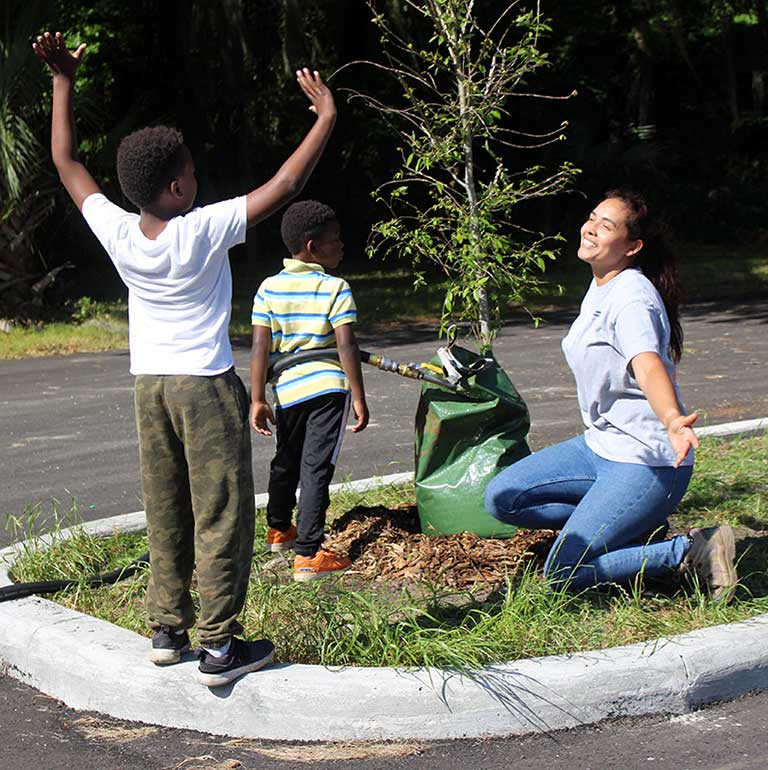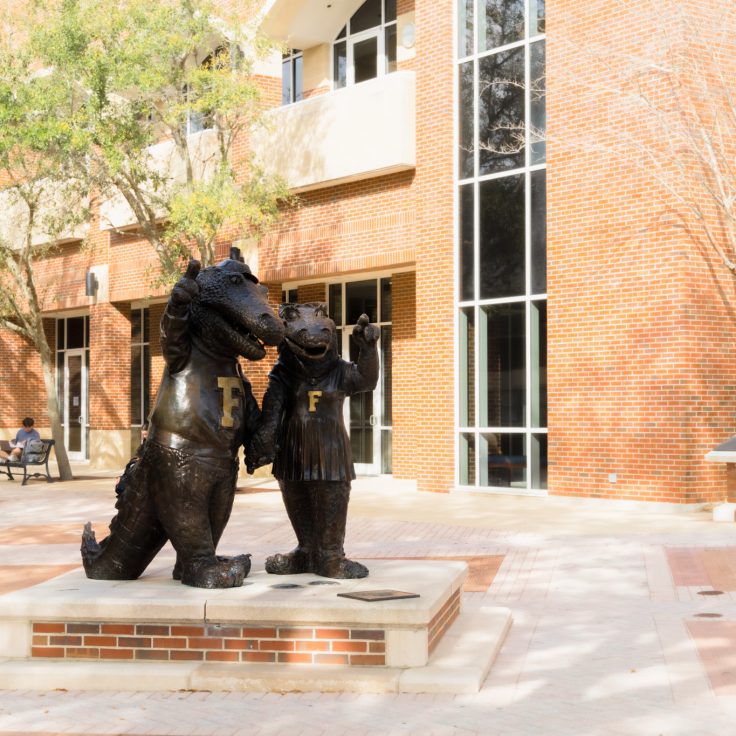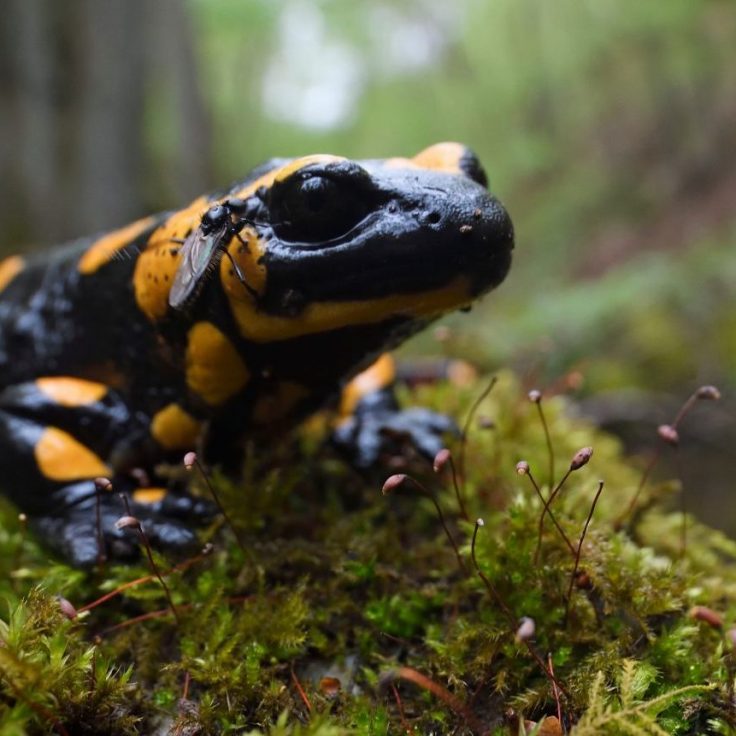
Wake-Up Calls
Environmental humanities scholars use compassion and connection to strike a chord and inspire collective change.
If the climate conversation were set to a tune right now, it might sound like a tragic ballad. Amid the doomsday scenarios playing on loop, the weight of grief hangs heavy in the air. Here in Florida, the discord of a shifting climate has become too loud to ignore: a sizzling sun scorches farmlands, hurricanes thrash coastlines, rushing waters flood streets.
We’ve heard the cries, but it’s often difficult to imagine a path forward. Scientific charts and statistics, tracking the losses in real time, warn us of a perilous tipping point fast approaching — according to some, we’ve already passed it. The unrelenting news and dramatic scenes can cause people to tune out or become mired in bleak questions: Why should we take action when it already seems like a lost cause? How can humans be part of the solution when we’ve caused so much damage? And if we don’t have scientific expertise, how can we really help anyway?
Climate change isn’t just an environmental emergency. It’s also a human emergency. Entering the conversation without sharing the human perspective is like encouraging a choir to sing without any lyrics. This is where the environmental humanities come in.
The emergent field tries to make sense of the human experience in this drastically changing world. It shifts the ecological narrative from a purely scientific center of gravity to apply diverse perspectives from areas like history, literature, and religion — science and art, synchronized in harmony.
Under the oak-lined avenues of the University of Florida’s campus, voices are rising, calling out for communal conversation to protect our planet’s future. They know that a single note of hope can reverberate far beyond to reach others. Their words are part unifying hymn and part battle cry. And they refuse to fall silent.
the Tree Whisperer
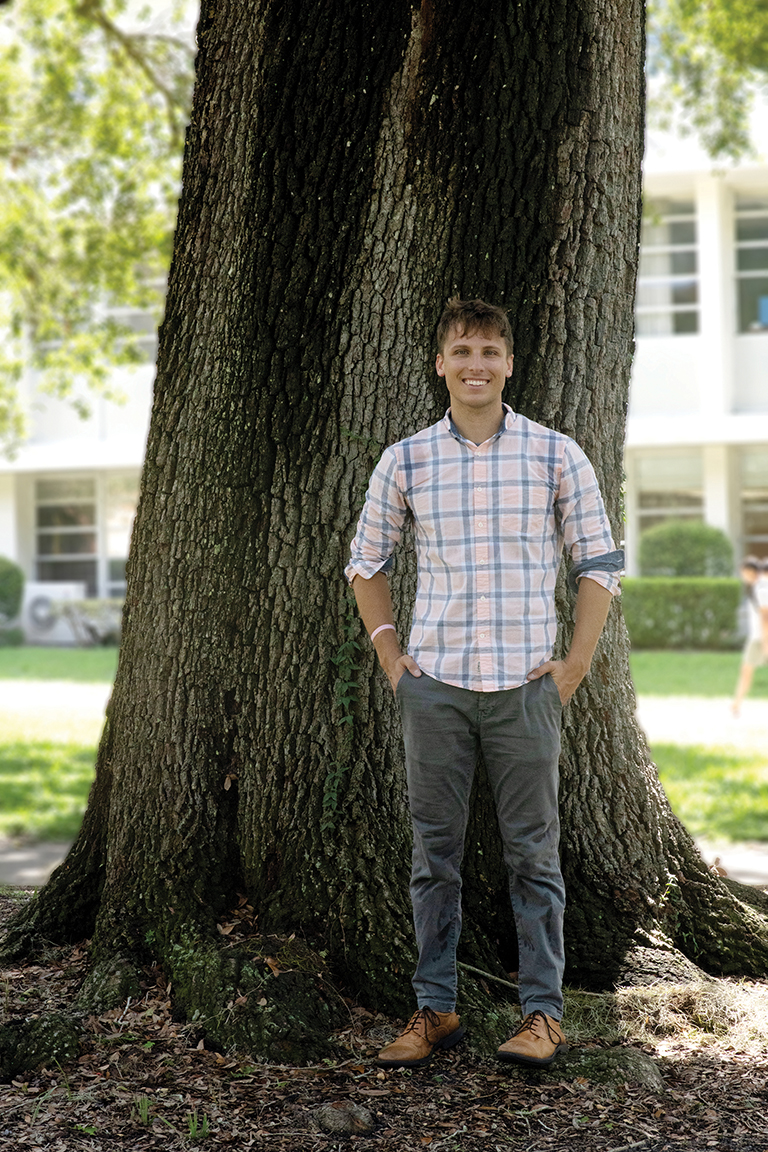
As fourth-year English PhD candidate LUKE RODEWALD made his way across campus last year, he came across the remnants of a sprawling live oak, chopped down the night before to make way for future development. As Rodewald watched the fragments being carted away, so monumental that four trucks had to transport its trunk in quarters, he paused to consider the decision-making involved. They just mirror similar, difficult decisions being made across the globe, Rodewald thought, in the tug-of-war between natural preservation and development.
Rodewald began to envision a term coined “arboreal pedagogy,” a teaching and learning practice that draws on students’ attention to the local landscape, particularly trees, as a starting point to consider complex global issues like environmental justice. The special topics course he taught this fall, “Writing About Trees,” takes this idea for a test drive. “So often when you hear about things like experiential learning or space-based learning, you think of science classes,” Rodewald said. “I’m trying to bring that sort of hands on, direct learning experience into composition and literature classrooms.”
With assignments like field journaling and reflective writing, Rodewald gives students the space to find ways to write about the things that matter most to them. He takes it a step further with a public writing assignment: Students inspire others to pay closer attention to the campus ecology with annotations placed near some of the trees and public spaces.
“I’m interested to see how these sensory experiences and these sustained observational exercises change a student’s relationship with UF and with their natural environment,” he said.
You can think of the college campus as its own built-in ecosystem – you’re already immersed in it.
Rodewald expands upon the concept in his dissertation work, which focuses on environmental humanities instruction, bringing the college campus into the discussion as an active agent to inspire change. “You don’t need a grant or external funding; there’s a lot that can be done with the resources right outside the classroom window,” he said. “You can think of the college campus as its own built-in ecosystem — you’re already immersed in it.”
the Protector
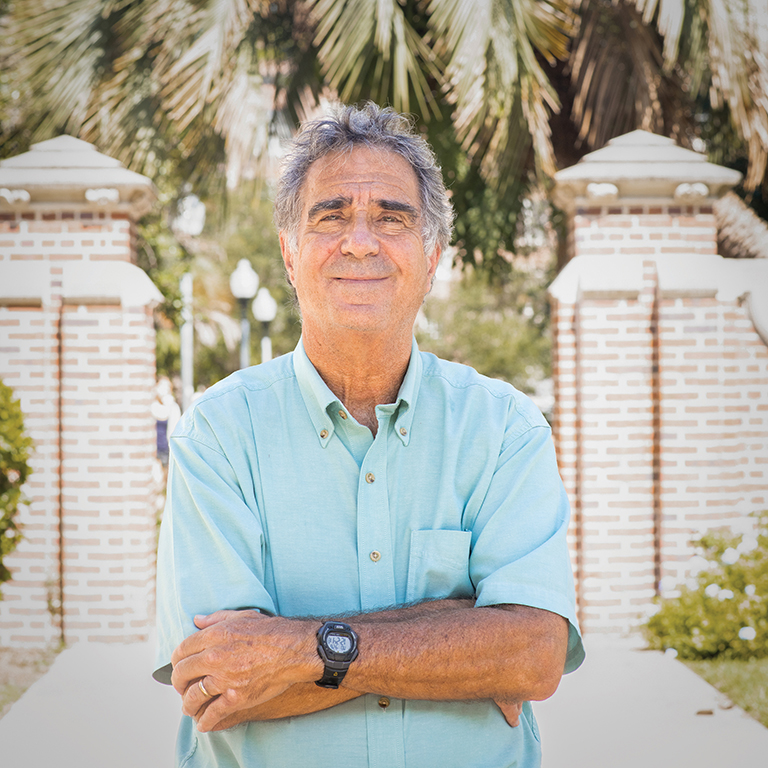
Although STEVEN NOLL didn’t grow up in the Sunshine State, he has become one of its fiercest protectors.
When he moved to Florida in 1974, Noll quickly grew enchanted by the surrounding freshwater springs and abundant natural resources around Gainesville. The week of their wedding, Noll and his wife celebrated by visiting nearby Poe Springs. The spontaneous excursion gave Noll a crash course in the fragility of the Florida ecosystem and the human potential to ruin it.
The newlyweds watched in horror as a semi-truck driver drove his cab directly into the spring, up to the middle of its front wheels, and got on the hood of the submerged vehicle to suntan on top. “It showed me how we can be so destructive to the environment,” Noll said.
Noll started canoeing Florida’s waterways, eventually using his passion for the state’s natural splendor to move into a historical analysis of it. “We are inextricably intertwined with the environment — we’re part of it, particularly in Florida,” he said.
Noll’s work exposes the conflicts that embroil the state, as money, power and political forces continue to shape the fate of its diverse natural water resources. In his 2009 book, Ditch of Dreams: The Cross Florida Barge Canal and the Struggle for Florida’s Future, Noll follows nearly two centuries of efforts to dig a canal clear through the center of the Florida peninsula, severing the state in two to allow ships to pass through it. The project failed, and the proposed infrastructure was instead transformed into the Marjorie Harris Carr Cross Florida Greenway, as part of the Florida park system. The triumphant tale of environmental stewardship reminds us of just how much we can gain by protecting the state’s natural resources. It’s important to celebrate our success stories in Florida, Noll stresses, not just our struggles.
We are inextricably intertwined with the environment — we’re part of it, particularly in Florida,” he said.
Now, in a forthcoming book project called It’s About Dam Time, Noll will expose the controversies surrounding the Kirkpatrick Dam (originally known as the Rodman Dam) a remnant of the Cross Florida Barge Canal infrastructure. Near Palatka, the 7,200-foot-long earthen berm continues to strangle the flow of a critical link for Florida wildlife: the mighty Ocklawaha River. Naturalists argue that restoring the river’s flow would resurrect 20 lost Florida springs and open habitats for the state’s manatee population, among other benefits.
Among his many speaking engagements and outreach events centered on environmental humanities, Noll is currently traveling around the state to give public lectures in conjunction with Water/Ways, a traveling exhibit from the Smithsonian Institution’s Museum on Main Street initiative. He has developed a series of talks with local angles to encourage the audience’s personal connections to the material presented: In Crystal River, it’s about manatees; in Apalachicola, it’s the Florida-Georgia water wars; in Belle Glade, the 1924 hurricane and big sugar industry.
“I’m trying to pass on an understanding of the historical roots of Florida nature and how unique Florida’s ecosystem is compared to the rest of the nation — how fragile it all is and how we must fight to protect it,” he said.
the Advocate
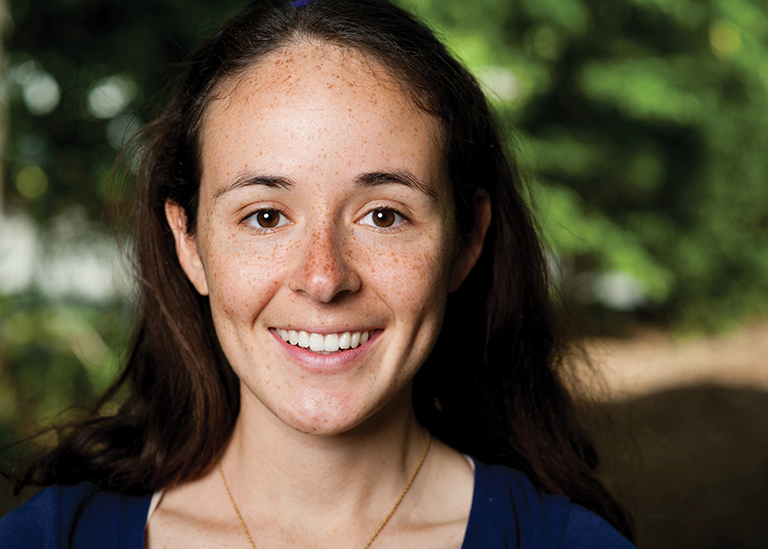
Alumna VICTORIA MACHADO recalls a South Florida childhood surrounded by water. When she arrived at UF as an undergraduate, Machado gravitated toward the sciences to embrace her environmental passions, but quickly realized that her mind was better suited for the humanities. “Particularly surrounding climate change, we have all the science for it and yet we are not making the strides that we should be making to live more sustainably,” Machado said. “When you’re studying any humanities, the idea is to try to understand ourselves and the world around us.”
Machado found a mentor in social and environmental ethicist ANNA PETERSON, whose work on religion in Latin America resonated with her. Upon graduating from a master’s program in 2013, Machado moved back home to South Florida, volunteering with a D.C.-based nonprofit called the Food & Water Watch. She later accepted a full-time position as a statewide organizer for the group, focusing on fracking in Collier County and oil drilling near the Everglades. “I always saw myself as an organizer — I’m energized when I can connect with people, and we can take steps together toward understanding a larger issue,” she said.
Realizing she wanted to delve deeper into the issues she was organizing around, Machado returned to UF for a PhD. “It’s hard to shift the narrative about our environment because we’re trained to think in numbers,” Machado said. “But I think that religion, spirituality, and the traditions we hold on to have roles to play.”
When you’re studying any humanities, the idea is to try to understand ourselves and the world around us.
While pursuing her PhD, Machado continued to advance her passion for public outreach. She worked with UF’s Center for the Humanities and the Public Sphere, connected with the Florida Humanities, and started writing opinion pieces for local news outlets. Like Noll, Machado continues to engage audiences outside of the educational academy by serving as a member of the Florida Humanities Speakers Bureau. Her state-wide talks, “Sacred Waters: Exploring the Protection of Florida’s Fluid Landscapes,” expose audiences to alternative narratives of environmental issues. “The very way that we talk about nature is mainly based on our use of it as a resource for consumption and profit,” she said.
Machado, who earned her PhD from UF in Spring 2021, now finds herself breaching the walls of a traditionally scientific arena: As a visiting assistant professor at Rollins College, she’s a member of the college’s environmental studies department.
Martin Luther King Jr.’s famed quote that the “arc of the moral universe is long, but it bends toward justice” inspires Machado’s approach to the environmental humanities. “We’re not working just for tomorrow, we’re working for the long haul,” she said.
the Aquaphile
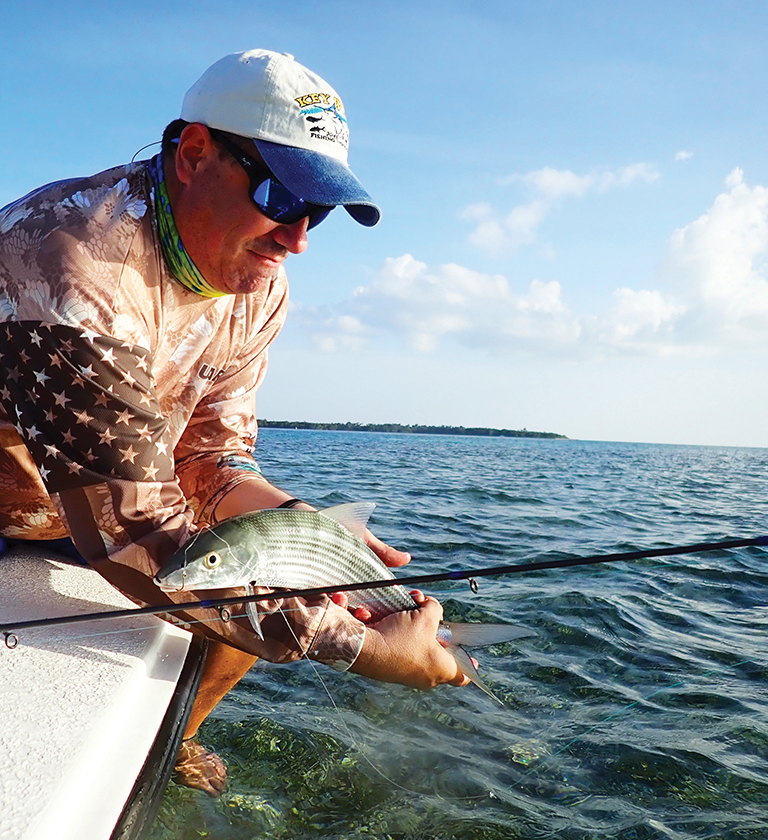
A few years ago, SID DOBRIN, Chair and Professor of English, started to recognize a troubling pattern in the conversations surrounding eco-criticism and ecology: they were all land-based. When maritime environments were discussed (if at all), terrestrial concepts and metaphors were thrust onto the aquatic realm. This revelation inspired Dobrin’s most recent book, Blue Ecocriticism and the Oceanic Imperative.
Working on a marina throughout high school and college, the ocean was always there for Dobrin. Known on his podcast as the “Fishing Professor,” he gives the ocean a voice in his writing, research and community outreach.
I might not be able to change policy, but I might be able to influence the people who change policy.
The first step of conservation, Dobrin knows, is connection. People must appreciate the beauty of a place before they’re driven to protect it. A master relationship-builder, Dobrin serves on a range of committees, traveling often to meet (sometimes on fishing boats) with congressional groups and policymakers. He served as chair of the American Sportfishing Association’s advocacy committee and now serves on the ASA Media Committee. He is also a frequent contributor to Guy Harvey magazine, Florida Sportsman magazine, Saltwater Sportsman magazine, and other publications. Most recently, Dobrin has taken up involvement in the Florida Institute for National Security, helping this UF initiative consider critical issues such as environmental and nutrition security and climate change.
“I’m a firm believer that we’ve got to be able to take what we do as researchers to a more public audience, whether through magazine writing, podcasting or advocacy,” he said.
Dobrin’s earlier book, Fishing, Gone? Saving the Ocean Through Sportfishing, implores fellow saltwater anglers to help protect the ocean by moving toward more sustainable practices. “A lot of people don’t recognize that there are over 50 million registered recreational anglers in the United States, forming close to a $70 billion industry,” he said.
His approach worked. The book caught the eye of several congressmen and even a Florida Supreme Court justice, who purchased and distributed 100 copies throughout Congress.
“The opportunity to be able to go and sit in a congressman’s office or in front of industry leaders and share this knowledge with them — that’s what it means to be a public humanities scholar,” Dobrin said. “I might not be able to change policy, but I might be able to influence the people who change policy.”
the Visionary
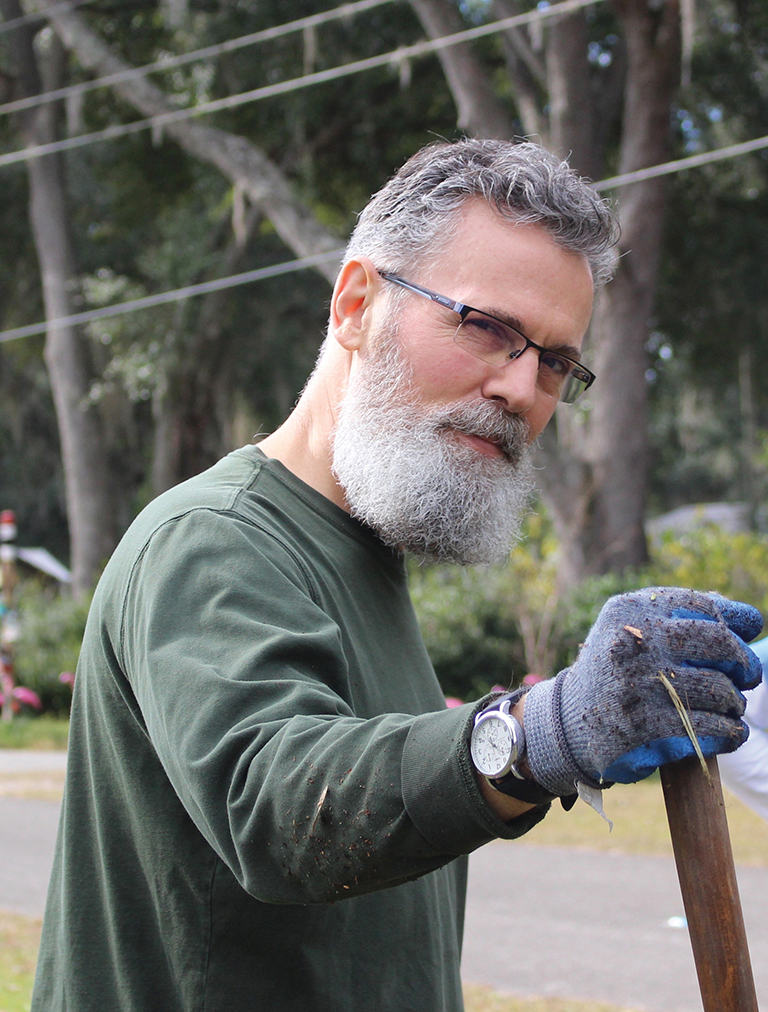
The turning point for historical science fiction scholar TERRY HARPOLD came six years ago when a bright student in his climate literature course came to office hours. She uttered words any instructor dreads hearing: “Yours is the worst class I’ve ever taken.” Taken aback, Harpold struggled to respond. The student continued: “No, the material’s great, you’re fantastic… but I can’t sleep at night.” Harpold had opened her eyes to a world in peril, and she didn’t know what to do.
At the time, Harpold had been working on a book about French science fiction novelist Jules Verne’s use of complex, intertextual puns. He halted work on the book full-stop and shifted his teaching to help redirect students’ existential anguish over climate change toward positive transformation. “I could get up in front of my class, stand on my desk and yell at them, ‘Don’t you understand, the world is on fire!’” But he cautions that approach only “drives people to cynicism and despair, to fleeing from constructive choices about our collective futures.” Now, Harpold encourages vital, purposeful engagement of his students with the environments they share with all living beings, and to act with “exuberant resolve” in the face of climatic disruption.
As part of his newfound charge, Harpold developed the Imagining Climate Change (ICC) initiative. It doesn’t look like most climate-centered initiatives — and that’s exactly the point. A hub for dialogue across the sciences, humanities and art, ICC hosts events that bring diverse perspectives like fiction, film, graphic arts, psychology, music, and dance into the fold.
“I wanted to create a venue on campus where the scientists and the humanists could have open, frank conversations about their alliances, and even their differences, about the reality of this problem,” he said. “We give scientists a chance to talk in a way they don’t normally talk, to step back from the data.” What’s more, ICC presents a platform for students across the humanities to become involved in climate conversations, where they often found themselves left out.
Your legacy is to pave the way forward.
As an ongoing ICC initiative, Harpold also coordinates a series of community tree plantings throughout the year. His group partners with Alachua County Department of Land Conservation and Management to plant saplings in underserved locations like Section 8 housing, elementary schools, and city parks — public areas that need more tree cover but tend to lack funding for such efforts.
It’s a powerful experience, Harpold said. “The species that we plant will live from 200 to 500 years — students and participants walk away with a finer appreciation of the mutualistic relationship of humanity to non-human life and the world,” he said. “When you plant a tree, you’re making a commitment to the future.”
The democracy of ideas at the university, according to Harpold, is the perfect opportunity for the cross-pollination and growth of thoughts. “I’ve been fortunate enough to be in the presence of young people who’ve had epiphanies. You can see the spark ignite in them,” he said. “This generation is called upon to be witness to the real state of the world, and then try to imagine what’s on the other side of the horizon of catastrophe. … Your legacy is to pave the way forward.”
interested in creating NEW CLIMATE POSSIBILITIES?
Explore the Imagining Climate Change initiative’s upcoming virtual and in-person events, including community tree plantings.
